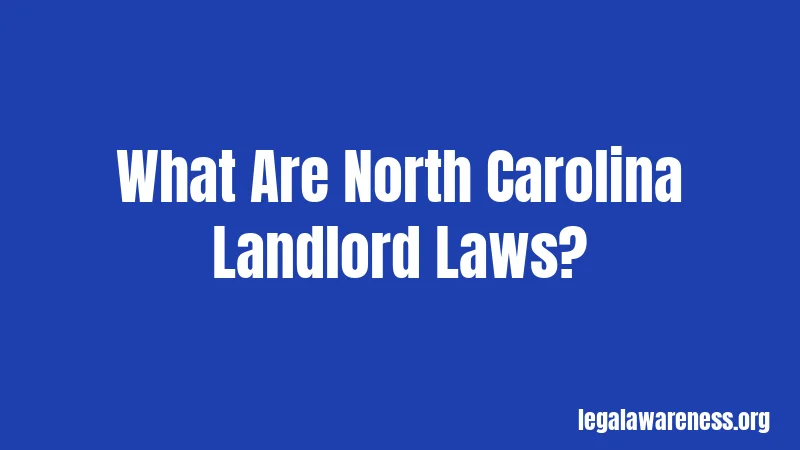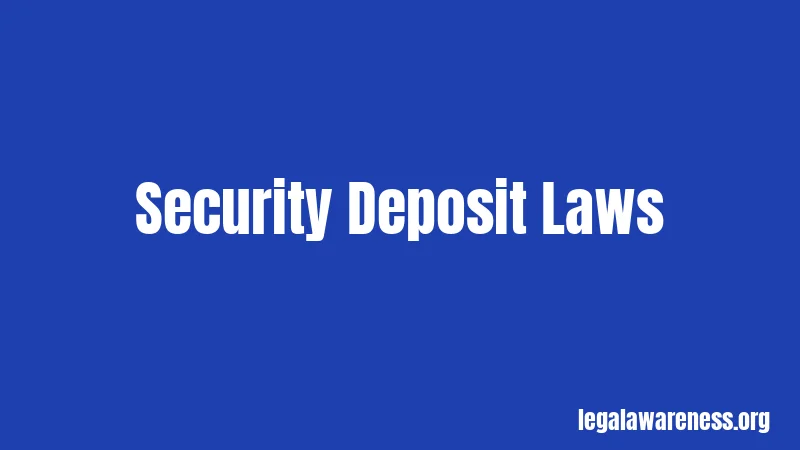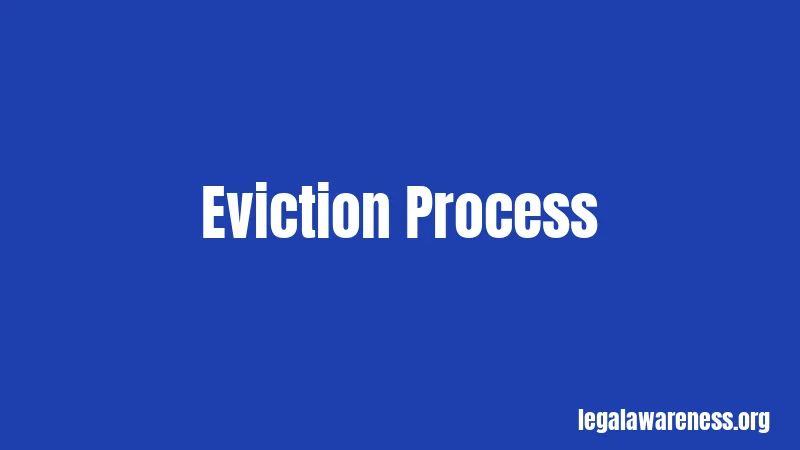North Carolina Landlord Laws in 2026: The Complete Breakdown
Most people don’t realize how landlord-friendly North Carolina actually is. Seriously. The state leans heavily in favor of landlords compared to other states. But that doesn’t mean there’s a free pass. There are still real rules you need to follow. Break them, and you’ll face legal trouble. Let’s talk about what you actually need to know.
Why does this matter right now? Because laws changed in 2025. If you’re renting in North Carolina—whether you’re a landlord or a tenant—the rules have shifted. Some of them might surprise you.
What Are North Carolina Landlord Laws?

Think of landlord-tenant laws like a contract rulebook. They set expectations for both sides. North Carolina General Statutes Chapter 42 covers all the main stuff. Pretty straightforward. These laws explain what landlords must provide, what they can charge, and what happens when things go wrong.
Here’s the thing: North Carolina is considered landlord-friendly. The state doesn’t pile on heavy regulations. That said, tenants do have legal protections. The state requires landlords to provide safe, livable homes. That’s non-negotiable.
Basic Landlord Requirements
Providing Safe Housing
You’re gonna love how simple this rule is, right? Landlords must provide what the law calls a “fit premises.” Translation: the rental unit needs to be safe and healthy.
That means working heat, running water, electricity, and sanitation systems. You need to make sure plumbing actually works. The electrical system can’t be hazardous. There can’t be pest infestations or rodent problems. Smoke detectors and carbon monoxide alarms are required. Yep, that’s all on the landlord.
Why does this matter? Because if you don’t provide these basics, tenants can report you to building inspectors. In cities like Charlotte, those inspectors don’t play around. Serious violations have to be fixed within days, not weeks.
Making Repairs on Time
Wondering if you need to fix things the tenant reports? The answer is yes. Landlords must make repairs within a “reasonable time” after tenants request them in writing.
What counts as reasonable? That depends on the repair. A broken heating system in winter? Days matter. A squeaky door? A few weeks probably works. The law doesn’t give exact timelines, so this can be fuzzy. But don’t drag your feet. Tenants can sue if you ignore maintenance requests.
Here’s where tenants get creative: If you don’t make repairs, they can go to court. The judge might order repairs, reduce their rent, or even declare the space “unlivable.” If the place is truly uninhabitable, tenants might be able to move out without breaking the lease.
Security Deposit Laws

Let’s get real about security deposits. This is where most landlords mess up.
Maximum Deposit Amounts
North Carolina sets firm limits on how much you can charge. The amount depends on the lease type:
Week-to-week leases: Two weeks’ rent maximum.
Month-to-month leases: One and a half months’ rent maximum.
Leases longer than a month: Two months’ rent maximum.
Confused about pet deposits? Let me break it down. Pet deposits count toward these limits. So if you charge two months’ rent plus a pet deposit, the total can’t exceed two months’ rent. However, you can charge a separate, non-refundable pet fee on top of that. But here’s the catch: that fee has to be “reasonable.” Courts usually interpret that as $200 to $500. Charging $1,000 for a cat? Yeah, that won’t hold up.
Where the Money Goes
Sound complicated? It’s actually not. Deposits must be held in a trust account at a licensed North Carolina bank. You can’t just keep it in your personal checking account. That’s illegal. Your other option is to post a surety bond. Either way, the money has to stay separate.
Within 30 days of move-in, tenants must receive written notice. Tell them the exact bank name and address. This protects everyone involved.
The Money Comes Back (Usually)
Okay, pause. Read this part carefully. When a tenant moves out, you have 30 days to return the full deposit or provide an itemized list of deductions. If repairs are still being estimated, you can send a partial accounting within 30 days and complete it within 60 days total. Miss these deadlines? You lose the right to keep any money.
What can you actually deduct? Unpaid rent, damages beyond normal wear and tear, cleaning costs if the place is left really dirty, utilities, late fees, and breach of lease costs. You can’t deduct for normal aging. Faded paint, lightly worn carpet in high-traffic areas, loose door handles—that’s just life. But holes in walls, broken tiles, and permanent stains? Fair game.
The difference matters. Really matters. “Normal wear and tear” is gentle aging from careful living. “Damage” is what happens when tenants don’t care. Courts will call you out if you charge for normal wear.
Late Fees and Rent Rules
How Much Can You Charge?
Late fees have limits. You can charge $15 or 5% of monthly rent, whichever is higher. But there’s a catch: rent has to be five days late before you can charge anything. And you can only charge once per late payment. You can’t keep stacking fees.
No Rent Control
Here’s the good news for landlords: North Carolina has no rent control. You can raise rent however much you want. There’s no “reasonable increase” cap. Seriously.
The catch? You need to give proper notice. For month-to-month leases, that’s 30 days written notice. For fixed-term leases, you can’t raise rent during the term unless the lease specifically allows it. At renewal time, 30 days’ notice works.
One heads-up: Don’t use your rent increase as retaliation. Tenants can’t increase rent because a tenant reported you for safety violations. That’s illegal.
Eviction Process

Now, here’s where things get serious.
Valid Reasons to Evict
You can evict for non-payment of rent. That’s the most common reason. You can also evict for lease violations—unauthorized pets, excessive damage, illegal activity. The process differs depending on the violation.
Illegal activity doesn’t require advance notice. Everything else does.
The 10-Day Notice
For non-payment of rent, you must give a written 10-day notice to quit. This is called a “demand for payment of rent.” It’s not an unconditional demand to leave. It gives tenants the option to pay or move.
This notice must include the date it was given. It should state the deadline for payment. It must say you’ll file eviction papers if they don’t pay by then. How you deliver it matters too—check the lease for specific instructions.
After ten days without payment, you can file an eviction lawsuit in small claims court. Once a judge rules in your favor, the tenant has ten days to appeal. If they don’t, you can request a writ of possession. That’s what authorizes the sheriff to remove them.
Never do a “self-help eviction.” Don’t change the locks. Don’t shut off utilities. That’s illegal and can result in damages against you.
Recent Changes (2025)
Hold on, this part is important. As of late 2024, willful damage over $1,000 became a felony in North Carolina. That’s new protection for landlords. Tenants who trash your property face serious criminal charges, not just civil liability.
Also, a 2025 insurance law clarified renters’ insurance rules. You can require tenants to carry renters’ insurance. But you can’t force them to use a specific company. If they don’t provide proof within three days, you can buy a policy for them and charge the actual cost plus a small admin fee.
Landlord Entry Rights
This one’s unique. North Carolina is unusual here. Landlords can enter the property without advance notice. Yep, you read that right. You don’t legally need permission.
But wait. Just because you can doesn’t mean you should ignore common courtesy. Tenants have a right to privacy and “quiet enjoyment” of their space. That means respectful behavior matters. Most landlords provide at least 24 hours’ notice anyway. It keeps peace and prevents tenant complaints.
For emergencies—fires, burst pipes, that kind of thing—you can enter immediately.
Discrimination and Retaliation
Okay… this one’s important. Federal fair housing law applies in North Carolina. You can’t discriminate based on race, color, religion, sex, national origin, disability, or family status. Period.
North Carolina has its own anti-retaliation rules. Can’t evict a tenant because they reported unsafe conditions. Can’t raise their rent as punishment. Tenants get 12-month protection after they take qualifying action.
There’s one twist: While North Carolina allows landlords to decline tenants using rental vouchers, if you participate in city or county subsidy programs, you must accept them.
What Happens to Deposits When Property Sells
Your property is selling? Don’t worry, this is handled. The deposit must transfer to the new owner. You can’t keep it. Tenants should get credit against any new deposit requirements. They shouldn’t have to pay twice.
Make sure tenants give the new owner proof of the original deposit. A copy of the lease and receipt helps. This protects everyone.
Local Rules That Matter
North Carolina allows cities to set their own rules. Charlotte, for example, has strict housing standards. The city’s Code Enforcement division actively checks properties when residents complain.
Don’t assume state law covers everything. Check your specific city or county. Some jurisdictions have additional requirements around inspections, maintenance timelines, or rental registration.
Late Fees and Added Costs
Want to know the limits on extra charges? Landlords can charge application fees, background check fees, and screening fees. These are separate from the security deposit. But they have to be reasonable and disclosed upfront.
Eviction-related fees must be disclosed in the lease. If you want to collect attorneys’ fees, the lease must say so. Attorneys’ fees can’t exceed 15% of what the tenant owes or 15% of monthly rent for eviction cases.
How to Stay Compliant
Step 1: Use written leases. Verbal leases might be legal, but written ones are the gold standard. Clearly state rent amount, deposit, fees, late charges, and house rules.
Step 2: Keep deposits in trust. Open a trust account at a licensed bank or post a bond. Notify tenants within 30 days where it’s held.
Step 3: Document everything. Take photos at move-in and move-out. Keep records of repairs, complaints, and tenant communications. This protects you legally.
Step 4: Follow eviction procedures exactly. Skip steps? You lose the case. Use proper notice, file correctly, attend court.
Step 5: Stay current on changes. Laws updated in 2025. Check with local authorities annually.
Step 6: Be fair with deductions. Only deduct for real damage beyond normal wear. Itemize everything. Provide receipts if questioned.
Frequently Asked Questions
Can I charge interest on security deposits? North Carolina doesn’t require interest on security deposits. Some property managers offer it as a perk to attract tenants, but it’s not mandatory. Unlike some states, you’re not required to share interest earnings.
What if a tenant breaks their lease early? You can keep the deposit to cover losses. However, you must make “reasonable efforts” to re-rent the unit quickly. This is called “mitigation of damages.” Any gap between tenants or advertising costs may come from the deposit.
Can I enter the property whenever I want? Legally, yes. But practically, no. Provide notice and respect privacy rights. This prevents disputes and maintains good tenant relations. Emergencies are the exception.
What counts as normal wear and tear? Faded paint, lightly scratched glass, loose door handles, worn carpet in high-traffic areas. These are normal. Holes in walls, broken appliances, permanent stains—these are damage.
Can I require renters’ insurance? Yes, as of 2025. You can require it in the lease. But tenants choose the company. You can’t force them to use a preferred provider. If they don’t provide proof within three days, you can buy coverage and bill them.
What if the tenant claims I’m retaliating? Retaliation claims are serious. Don’t raise rent, decrease services, or evict within 12 months of a tenant reporting safety issues. If the timing looks bad, courts will side with the tenant.
How long do I have to return the deposit? Thirty days. If you need more time to assess damages, send a partial accounting at day 30 and finalize it by day 60. Miss these deadlines and you lose the right to withhold money.
Final Thoughts
North Carolina is landlord-friendly, but don’t let that make you careless. Follow the rules. Document everything. Treat tenants fairly. Stay updated on changes—law updates happened in 2025, and more might come.
The biggest mistakes landlords make? Not following eviction procedures exactly. Mishandling security deposits. Not documenting repairs and damage. These cost real money in court.
Now you know the basics. Stay informed, stay safe, and when in doubt, consult a lawyer. It’s worth it.
References
- North Carolina General Statutes Chapter 42 – Residential Tenancies
- Legal Aid of North Carolina – Landlord-Tenant Laws Guide
- NC Department of Justice – Landlord/Tenant Information
- 2026 NC Landlord Law Changes & Compliance Guide – Henderson Properties
- North Carolina Rent Increase Laws 2025 – MyLolo Wentworth
